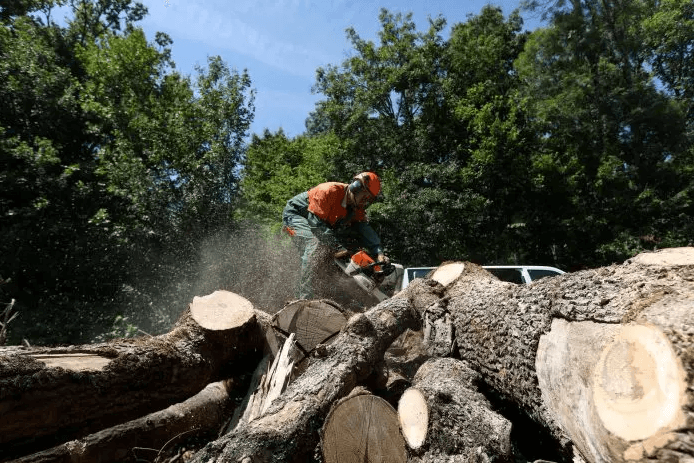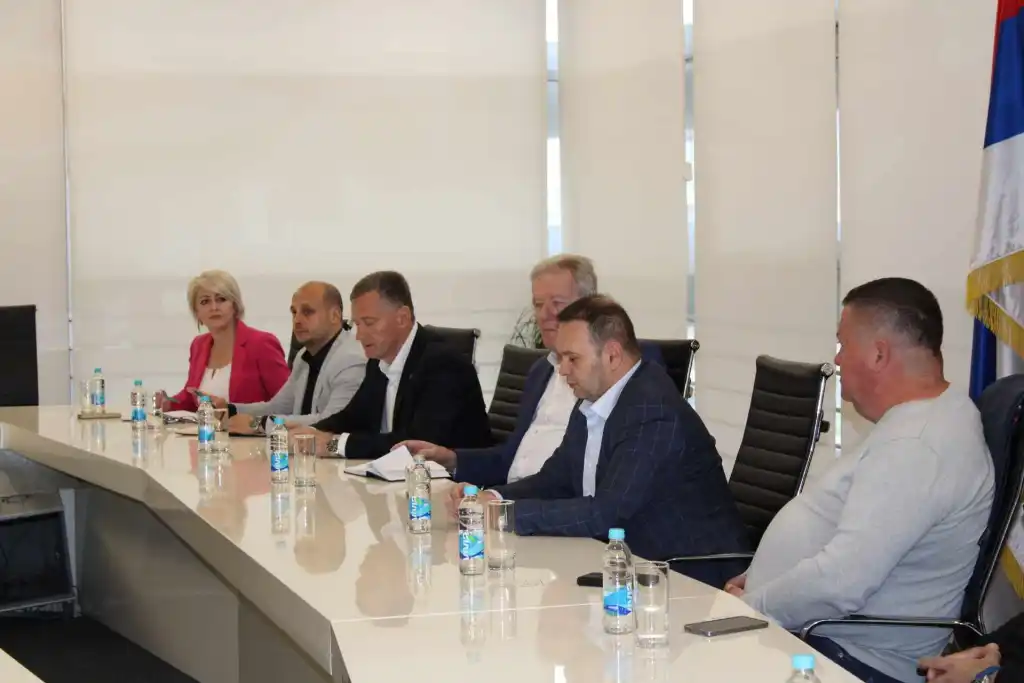Author: Slađan Tomić
The Chinese company from the Shandong Group, known for secret contracts, is donating the conceptual design for the construction of an expressway, which will cost three billion BAM, to the Highways of Republika Srpska. However, even those who attended the signing have not seen the contract.
At the end of May this year in Banja Luka, representatives of the Highways of Republika Srpska and the Chinese Shandong Group for International Economic and Technical Cooperation signed a cooperation agreement for the preparation of technical documentation for the project of constructing the Bijeljina – Zvornik – Milići – Han Pijesak – Sokolac expressway. Acting Executive Director for Technical Affairs of the Highways of Republika Srpska, Slobodan Stanarević, stated at the time that the Chinese partners committed to donating the technical documentation to the Highways of Republika Srpska.
The general project for the construction of the Bijeljina – Sokolac expressway was carried out by the Civil Engineering Institute “IG” Banja Luka, which earned almost 300,000 KM from this job from the Highways of Republika Srpska.

The Civil Engineering Institute “IG” Banja Luka was part of the controversial conglomerate Integral Engineering owned by the recently deceased Stanimir Stanković, which, due to its ties with the President of Republika Srpska, Milorad Dodik, was placed on the sanctions list of the US Department of the Treasury in October 2022.
“Both Stanković and Integral are associated with corruption in the construction sector, where Integral received some of the largest projects in Republika Srpska thanks to its proximity to the leadership of Republika Srpska”, stated the sanctions decision. Due to the death of the owner Stanković, the company was removed from the US sanctions blacklist in April this year.
The Civil Engineering Institute “IG” Banja Luka now operates independently and, with a revenue of almost 15 million KM in 2023, is quite successfully winning tenders announced by numerous public companies.
In one such tender for the preparation of studies for the construction of the Gacko 2 Thermal Power Plant worth almost a million KM, Elektroprivreda RS was accused of significantly inflating the value of the tender and tailoring the participation conditions specifically for the Civil Engineering Institute (IG), as detailed by Capital.

IG Banja Luka was also involved in projects with Elektroprivreda BiH. In a recently secured deal, IG Banja Luka was part of a consortium with Chinese companies Dongfang Electric International Corporation and Fujian Longjing Environment Technology Co., Ltd., as well as the Zenica-based ITC. Due to indications of favouritism towards the bidders for a job worth 63 million KM (excluding VAT), which pertained to the flue gas desulfurisation project at Unit 6 of the Tuzla Thermal Power Plant, a criminal complaint was filed with the Federal Police Administration (FUP) against several individuals in Elektroprivreda BiH, led by director Sanel Buljubašić, as reported by Amil Dučić on the Fokus portal.
The complainants stated that due to the failure of the Civil Engineering Institute IG Banja Luka to fulfil its obligations, contracts related to HE “Una” from July 2018 and TE “Kakanj” from March 2020 were terminated, causing direct damage to Elektroprivreda BiH. Nevertheless, despite not having an entirely stellar track record, IG Banja Luka successfully completed the project documentation for the construction of the Bijeljina-Sokolac expressway.
Old Story, New Contracts
The story of the Bijeljina-Sokolac expressway project is more than seven years old and was initiated after discussions about the construction of the Belgrade-Sarajevo highway, which was supposed to be financed by Turkey.
The two entities within Bosnia and Herzegovina could not agree on the highway route, but they did agree on the route of the Bijeljina-Pale expressway.
According to sources from Info Veza, the route will go from Bijeljina through Zvornik, Vlasenica, Han Pijesak, Sokolac, and to Podviteza – Pale, where it should connect with the road to Goražde.
In November last year, a meeting was attended by the President of Republika Srpska, Milorad Dodik, and the Prime Minister, Radovan Višković. They discussed with representatives of the Chinese company Shandong Hi-Speed International. The meeting was attended by the mayors of the municipalities through which the expressway route passes, while the mayor of Bijeljina, Ljubiša Petrović, did not attend but sent his representative. After the meeting, the public did not receive enough information, nor did those who attended the meeting. Nevertheless, they are satisfied that someone, under unknown conditions, will build a road in eastern BiH, a part of the country where road infrastructure is more than inadequate.
 “There was an initiative, and the Chinese appeared, with whom a memorandum of intent was signed, as well as an agreement to prepare project documentation for the expressway from Bijeljina to the municipality of Pale, somewhere around Sjetlina, Podviteza, so that it would become a hub connected with Goražde”, said the mayor of Sokolac, Milovan Bjelica, in a statement for Info Veza.
“There was an initiative, and the Chinese appeared, with whom a memorandum of intent was signed, as well as an agreement to prepare project documentation for the expressway from Bijeljina to the municipality of Pale, somewhere around Sjetlina, Podviteza, so that it would become a hub connected with Goražde”, said the mayor of Sokolac, Milovan Bjelica, in a statement for Info Veza.
The project documentation, he says, is a gift from the Government of the People’s Republic of China to Republika Srpska.
Bjelica says it is not surprising that the public cannot see the contract, nor that even he has not seen it, although he had to grant the necessary permits for the expressway route through the municipality he leads.
“Nobody would play with this, for sure. The important thing is that it gets done, that it gets built, and what’s in the contract, I don’t know, and I don’t believe if it’s a donation, and the Chinese are cautious about that, that there’s anything suspicious. If it were about execution, I would question it”, says Bjelica.
His trust might be justified if the deals of the Chinese consortium of companies, which are giving gifts to the Highways of Republika Srpska, were transparent and if there were no reports of numerous irregularities. In mid-June 2021, the Minister of Transport of the Sarajevo Canton, Adnan Šteta, signed a contract for the execution of works with a consortium of two Chinese companies – China Shandong International Economic & Technical Cooperation Group Ltd. and China Railway No.10 Engineering Group, which were supposed to reconstruct over 21 kilometres of tram tracks in Sarajevo. A year after the project’s completion, details of this publicly funded project remain shrouded in secrecy. Transparency International in BiH sued the Sarajevo Canton Ministry of Transport for the non-transparency of this contract in the Sarajevo Cantonal Court.
“We, as a local community, have done everything necessary for the preparation of the conceptual design”, Bjelica says. He does not know the conditions and details of the contract but knows the route it will take.
“We were at that meeting, we were informed about the corridor through which the expressway from Bijeljina to Pale will go, and there was a presentation of that corridor in my office. Now, in this phase, the project documentation is being prepared from Bijeljina to Zvornik, the second phase is from Zvornik to Podromanija (Sokolac), and further to Podviteza (Pale)”, says Bjelica.
This project has been talked about for years, but details have never been disclosed, and even he believes that construction will take some time.
“I think we will wait a little longer for funds to be secured because the route from Bijeljina to Podromanija is estimated to cost at least 1.5 billion euros”, says Bjelica.
The authorities of Republika Srpska have signed two documents in total to start the construction preparation. The first is a Memorandum of Intent for the preparation of project documentation.
“After that, another meeting was held where the contract for the preparation of project documentation from Bijeljina to Podromanija was signed. But since then, the only thing that has happened is that meeting where we were informed about the corridor of the expressway, and now, in this phase, the project documentation is being prepared from Bijeljina to Zvornik”, explains Bjelica.
How Much Does the Chinese Gift Cost?
Chinese companies, like other companies worldwide, operate for profit, so the question arises as to why someone would offer their services for free, giving up hundreds of thousands of BAM in profit or millions in revenue. The answer can only be one – the authorities will have to return the favour. What will be given to the Chinese is still unknown, and the responsible institutions do not respond to our inquiries.
“As far as Chinese influence is concerned, it is obvious that they have a great interest in working on projects in both Republika Srpska and the Federation of Bosnia and Herzegovina. The way Chinese companies are favoured is that they come with capital and labour. In no case do we have financial models, we do not have contracts in most cases on what our authorities commit to fulfilling their obligations under the contracts, in what way, how much, and what will be paid, with what penalties, etc”., they say from Transparency International for Info Veza.
Bjelica says that there is no money for road construction and that creditors will have to be sought. Many creditors are giving up financing projects in Republika Srpska, and even the authorities are giving up on more favourable European creditors. The Prime Minister of Republika Srpska previously said that the idea of financing the Foča-Šćepan Polje road with EBRD and the World Bank had been abandoned. Instead, they decided to take a loan from the Chinese EXIM Bank. The authorities of Republika Srpska have once again embarked on a project for which they do not know how it will be financed.
“There is no money, creditors will be sought. I have not seen the contract either, there will probably be an annexe. The current contract is that they donate that project documentation to Republika Srpska”, says Bjelica.
It is in the annexes that many unfavourable provisions for the countries to which project documentation is donated may be hidden. Some countries, like Montenegro, pledged public assets to Chinese creditors. Fortunately, they did not end up losing the port of Bar.
“When it comes to such generous projects, it is not without some interest, probably financial, because we can only assume that after that comes a job that will be many times profitable, so it pays off to make such studies or similar documentation, followed by another project that covers all that financially. Of course, it should be noted that in all public investments involving companies from the People’s Republic of China, whether citizens, associations, or journalists inquire, contracts are hidden”, adds Transparency International.
Initially, inquiries were rejected without explanation, and later justifications were given – disclosing the information would harm the commercial interests of Chinese companies.
“They do not explain what those commercial interests are since it is a public interest because public funds are being spent. Those commercial interests are obviously very well protected, and nothing is really free. Whoever works for free probably has subsequent projects that only they can carry out. The question is what follows after that, no serious legal or physical entity will do anything for free, and when they do, some job must follow that covers it”, adds TI BiH.
The Chinese company Shandong Hi-Speed International (SDHS), registered as the representative office of “China Shandong International Economic and Technical Cooperation Group”, is building a 40-kilometer-long and approximately 297 million euros worth highway from Banja Luka to Prijedor. Construction began in 2021, and completion is expected in 2026. However, although the works should be nearing completion, it was discovered that this Chinese company obtained a construction permit for only 15.7 kilometres instead of 40 kilometres.
A secret contract was concluded with the Government of RS at the end of 2018, and after the Banja Luka District Court issued four judgments ordering the responsible ministry to publish it, the contract was delivered to the Center for the Environment from Banja Luka. However, data on the spent money were not provided in this contract. It is known that the Chinese company will earn about 975 million euros from toll collection on the invested approximately 300 million euros during the 30-year concession.
Judging by the previous business schemes of the Chinese Shandong Group, the veil of secrecy around the construction of the Bijeljina-Sokolac expressway should already be a loud alarm for concern.
The Secret Contract for the Construction Project of the Bijeljina-Pale Expressway Not Seen Even by Those Present at the Signing
The Chinese government is gifting Republika Srpska the preliminary design for the construction of an expressway that will cost three billion BAM.
What is the secret behind Chinese gifts? No one can answer this question with certainty. Partly because perhaps even the donors do not know what they will demand in return – indebtedness, the selection of a Chinese contractor, or something else, and partly because the contracts for the project design are secret.
In November last year, a meeting was attended by the President of Republika Srpska, Milorad Dodik, and the Prime Minister, Radovan Višković. They discussed with representatives of the Chinese company Shandong Hi-Speed International. The meeting was attended by the heads of the municipalities through which the expressway route passes, but the mayor of Bijeljina, Ljubiša Petrović, did not attend and instead sent his representative. After the meeting, the public did not receive enough information, nor did those who were at the meeting. However, they are satisfied that someone, under unknown conditions, will build a road in the eastern part of BiH, a part of the country where the road infrastructure is more than inadequate.
How Much Will Chinese Gifts Cost Us?
Chinese companies, like other companies worldwide, operate for profit, so the question arises as to why someone would offer their services for free, giving up hundreds of thousands of BAM in profit or millions in revenue. The answer can only be one – the authorities will have to return the favour. What will be given to the Chinese is still unknown, and the responsible institutions do not respond to our inquiries.
It is precisely in the annexes that many unfavourable provisions for the countries to which project documentation is donated can be hidden.
“When it comes to such generous projects, it is not without some interest, probably financial, because we can only assume that after that follows some job that will be many times profitable, so it pays off to make such studies or similar documentation, after which comes another project that covers all that financially. Of course, it should be noted that in all public investments involving companies from the PRC, whoever inquires – citizens, citizens’ associations, journalists – the contracts are hidden”, adds Transparency International.
Initially, inquiries were rejected without explanation, and later justifications were given – disclosing the information would harm the commercial interests of Chinese companies.
“Not explaining what those commercial interests are since it is a public interest because public funds are being spent. Those commercial interests are obviously very well protected, and nothing is really free. Whoever works for free probably has subsequent projects that only they can carry out. The question is what follows after that, no serious legal or physical entity will do anything for free, and when they do, some job must follow that covers it”, adds TI BiH.






